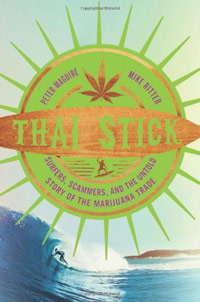Thai Stick, the book
Thai Stick: Surfers, Scammers, and the Untold Story of the Marijuana Trade
They called themselves “scammers.” Many were surfers, Southern California kids in the 60s and 70s looking to avoid the draft or just extend their ride with a little dope smuggling. At first they moved a few ounces or pounds at a time, in false-bottom suitcases or hollow surfboards, from Mexico to California or Hawaii. Some did it just to make enough to finance the next surf trip, some from hippie utopianism, some for adrenaline. They didn’t see themselves as real criminals. “We were disorganized crime,” one of them said. “It was just a bunch of idiot surfers running around like Laurel and Hardy on the high seas.” Then the war in Vietnam opened up new sources, new markets, and new levels of money and danger, and some of the surfer-smugglers rode the drug trade to millions — many to prison, some to death. In the process, they, along with the idealism of 1960s American culture, rode into a bigger, darker world — our own.

Thai Stick: Surfers, Scammers, and the Untold Story of the Marijuana Trade, written by Peter Maguire and Mike Ritter, narrates the history of an era, a culture, and a business, centered on Thailand during and after the Vietnam War, following the strands of a web of drugs, war, and surfing from California to Hawaii, Bali, Southeast Asia, and back again. It is built up from interviews with a Technicolor cast of pioneering surfer-smugglers, Thai and Vietnamese fixers, Cambodian torturers, and American DEA agents — some named, some unnamed, for fear of prosecution. The authors write from personal experience. Maguire, a historian and lifelong surfer from Los Angeles, worked for a time in Phnom Penh, Cambodia, documenting the savagery of the Khmer Rouge’s Tuol Sleng prison. There, he came into contact with co-author Mike Ritter, a surfer from Santa Barbara, who had first smuggled hash from Afghanistan in 1968 and gradually found his métier moving Thai marijuana in the 1970s, riding the wave from its beginnings to its swashbuckling heyday to eventual jail time.
The backdrop is a nation in conflict: an old, Cold-War America at war in Southeast Asia to preserve its view of the world, and a young generation of Americans determined to reject that reality and build a more enlightened and more fun one. Many of the scammers followed the 1960s Hippie Trail through Morocco, Afghanistan, India, Nepal, and Bali. The U.S. military unlocked the golden door to Thailand for them when it built a highway from Bangkok all the way to the Laotian border, planting five bases and tens of thousands of troops in the remote country along the Mekong River, where hill tribes have grown the world’s best grass for centuries. There, they discovered Thai sticks: seedless, potent pot wrapped around a bamboo sliver — “The Cuban cigar of the marijuana world” in the words of one DEA agent. They were as easy to get as beer or girls, and cheap: five for a buck.
The surfer-scammers interviewed here saw opportunity and began moving the weed out to Bali, California, Hawaii, and elsewhere, and the business quickly ballooned from packed surfboards to yachts to trawlers, and finally, to real ships, playing a deadly game of tag with Thai police, Chinese crime syndicates, Vietnamese communists, South China Sea pirates, and the DEA. Maguire even found evidence that two surfers’ sailboat was intercepted at sea by the Cambodian Khmer Rouge, who imprisoned, tortured, and killed them.
Thai Stick is replete with excellent adventures: of eluding gangsters, moving “loads” off Pattaya Beach at night; surviving 40-foot storm waves in the Gulf of Alaska; or landing Zodiacs through massive Northern California surf while the Coast Guard gives chase. It also asks serious questions. While the DEA eventually squashed the Thai trade to the U.S., what did this “victory,” one of the few the War on Drugs might boast, achieve?
4•1•1
Thai Stick author Peter Maguire will be at Chaucer’s Books on Friday, November 8, at 7pm.



